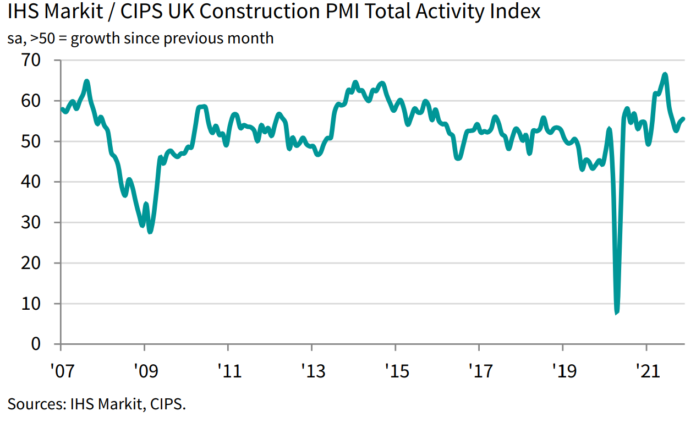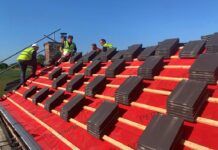The latest survey data has shown that UK construction companies saw a sharp increase in business activity during November, led by the fastest upturn in commercial work since July, as clients continued to boost spending in response to the reopening of the UK economy.
At 55.5 in November, up from 54.6 in October, the headline seasonally adjusted IHS Markit/CIPS UK Construction PMI Total Activity Index signalled a robust and accelerated expansion of overall construction activity. The index has now posted above the 50.0 no-change value for ten consecutive months and the latest reading pointed to the strongest rate of expansion since July.
On closer inspection, a steeper rise in commercial construction (index at 56.5) helped offset a slight slowdown in house building growth (54.7, down from 55.4). Meanwhile, civil engineering was the weakest performing area in November (53.9), although the latest rise in activity was the largest since August.
Another solid increase in new business volumes helped to boost construction output during November, with this index hitting a three-month high. Survey respondents mostly noted that improving client demand had led to increased numbers of new enquiries, although some firms suggested that supply constraints had a negative impact on confidence.
Job creation
Construction firms also sought to increase their business capacity in November, as signalled by another steep rise in staffing numbers. However, the overall speed of job creation eased to an eight-month low, with sub-contractor usage also increasing at a slower pace in November. The latest survey also indicated that sub-contractor availability decreased to the least marked extent since May.
Rising demand
Continuing the trend with demand, November data pointed to another robust rise in demand for construction products and materials. Higher levels of input buying reflected a combination of increased workloads and efforts to build inventories due to supplier delays.
However, while the index measuring overall supplier performance reached its highest level since April, it remained well inside negative territory. Around 47% of the survey panel reported longer lead times in November, while only 4% reported an improvement. Port delays and a severe lack of transport availability due to haulage driver shortages continued to hold back supplier performance, although firms noted an improvement in the availability of specific items (especially timber).
Haulage shortages
The data also showed that the industry may have overcome the worst of the supplier delays, with only 47% of survey respondents citing longer delivery times in November, a dramatic fall from the 77% peak in June. Rapid input price inflation persisted, and haulage driver shortages added to cost pressures, but the latest overall rise in operating expenses was the least marked for seven months.
Purchase prices
Around 72% of the survey panel reported an increase in purchase prices in November, while only 3% reported a decline. That said, the resulting index signalled the least marked rate of cost inflation since April. Rapid price pressures and supply shortages were a factor dampening business optimism in November. The latest data also signalled the weakest output growth projections for four months.
Industry thoughts…
Commenting on the data, Paul Dally, partner at global legal business DWF, commented: “The data shows a sharp increase in business activity during November, led by the fastest upturn in commercial work since July. However, job-hiring growth was still maintained in November but was the weakest since March.
“On the flipside, there were signs that the worst phase of supplier delays may have passed, with the portion of survey respondents citing longer delivery times falling to 47% in November in comparison to 77% in June. Whilst this is a glimmer of hope, the ongoing driver shortages and port delays have resulted in supply chain managers buying more than their immediate, which means supply chain disruptions are far from over.”




